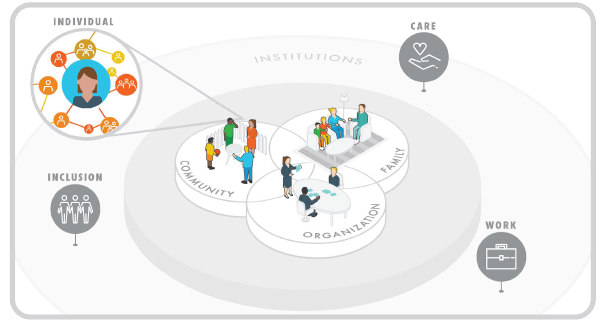Mission
Developing Solutions for Care, Inclusion, and Work
The key challenges for societal resilience result from external shocks, spillover, and feedback cycles. These can represent threats to existing cooperative arrangements, but may also provide opportunities to develop novel solutions for care, inclusion, and work. This can be achieved by specifying which individual and societal values need (re-)alignment; understanding the psychological mechanisms that connect individuals through their common identities, goals, and networks; and identifying which institutional provisions and arrangements are needed to address these. The analytical tools are offered by the SCOOP approach, which integrates theoretical insights and links empirical evidence from different disciplinary and methodological perspectives to develop roadmaps for effective policy strategies and solutions.
Intervention Focus
Our SCOOP approach to develop roadmaps for resilience incorporates the features of so-called Wise Interventions, specified by Stanford University. The success of this stepwise procedure to build interventions that have lasting societal effects has now been convincingly demonstrated indifferent domains and national contexts. Distinctive features of a ‘wise’ intervention prescribe that they are psychologically precise, address recursive processes, and are context dependent – instead of offering generic ‘silver bullet’ solutions. The program of research we propose offers just that, by:
- incorporating experimental examinations to isolate the implicit psychological mechanisms that impact upon key behaviours (securing psychological precision),
- considering value convergence, learning from historically documented long term effects, and targeting vicious vs. virtuous feedback cycles (addressing recursive processes),
- comparing the effectiveness of different institutions under different circumstances (tailoring solutions to specific sociological contexts and circumstances). These features of our approach allow us to develop and test interventions to be effective and have long term effects.





